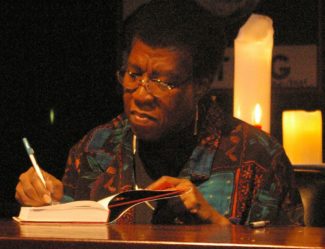Traveling in chains…
Author: Octavia E. Butler
 I read a lot of science fiction when I was a teenager. Mostly from the Golden Age when authors like Asimov, Bradbury, Clarke and Heinlein reigned supreme. I have to admit that at the time I was reading it – late ‘70s and early ‘80s – the obvious fact that all of these authors – and the vast majority of their contemporaries – were white men didn’t really catch my attention. I’m sure that wasn’t the case for Octavia Butler. The fact that there were no black or female science fiction writers when she was growing up made it almost impossible for her to even think of becoming a successful writer herself. Yet she started writing and persevered throughout the ‘70s and in 1979 she published what would go on to be her best-selling novel, Kindred. It was just the start for this groundbreaking author, who would spend the next three decades opening the science fiction universe for African-American and feminist writers and readers around the world. It’s my first – long overdue – encounter with her work and I have to say that she brings a remarkable breath of fresh air to a genre that was often the source of too much cringe-worthy material for far too long.
I read a lot of science fiction when I was a teenager. Mostly from the Golden Age when authors like Asimov, Bradbury, Clarke and Heinlein reigned supreme. I have to admit that at the time I was reading it – late ‘70s and early ‘80s – the obvious fact that all of these authors – and the vast majority of their contemporaries – were white men didn’t really catch my attention. I’m sure that wasn’t the case for Octavia Butler. The fact that there were no black or female science fiction writers when she was growing up made it almost impossible for her to even think of becoming a successful writer herself. Yet she started writing and persevered throughout the ‘70s and in 1979 she published what would go on to be her best-selling novel, Kindred. It was just the start for this groundbreaking author, who would spend the next three decades opening the science fiction universe for African-American and feminist writers and readers around the world. It’s my first – long overdue – encounter with her work and I have to say that she brings a remarkable breath of fresh air to a genre that was often the source of too much cringe-worthy material for far too long.
In Kindred, Dana and Kevin are young newlyweds and aspiring writers in 1976 Los Angeles. Life is going along normally for the couple, with the usual financial and relationship struggles, when all of a sudden Dana becomes dizzy and is suddenly transported to the year 1815 in eastern Maryland. As a black woman, there are few places in space and time more dangerous than the antebellum South and this harsh fact becomes apparent very quickly. She goes on to experience several abrupt transitions back and forth between these two locations, so completely disparate in character. Each trip back in time allows her to get to know the Weylin family and the enslaved people that labored on their farm. She eventually starts to realize that these repeated trips to the early 19th century might actually impact her very existence in the late 20th.
Through Dana’s repeated and hazardous travails, Butler presents an undeniably strong female character, something that had been typically missing in the classic science fiction that preceded it, which tended to present women from a thoroughly adolescent perspective. Despite the dangers she faces as a black woman in early 19th century Maryland, Dana rarely resists the urge to speak her mind and use what little power she has to ensure her survival. To be inside her head as she shrewdly calculates her next move, weighing the risks, is consistently riveting.
The book also presents American slavery in all its horror, a perspective that was relatively new at the time. The television miniseries Roots had taken the nation by storm just two years prior to the release of Butler’s novel and much like the groundbreaking show, Kindred makes no effort to soften the vile realities that every enslaved person faced every day. While science fiction has often been used to make social statements, I don’t think I’ve ever read anything that has capitalized on that opportunity so completely.
While it breaks ground both as feminist and African American literature, Kindred is also a thoroughly entertaining adventure; it even works as a unique love story. I recommend it highly, particularly if you don’t like science fiction. I’m not a gambling type of person, but I am willing to wager that this book is not anything like what you think science fiction is. Moreover, while I’ve always had a soft space in my heart for the traditional genre, I would agree that a profound transformation like this is a very good thing. I’m truly inspired to seek out more of Butler’s subsequent work.
— D. Driftless
Author photo by Nikolas Coukouma (CC BY-SA 2.5)
Other books about slavery, both fiction and non-fiction: Barracoon / Twelve Years a Slave / Slave Old Man / Never Caught
[AMAZONPRODUCTS asin=”0807083100″]
- Best Non-Fiction of 2016 - February 1, 2017
- Little Free Library Series — Savannah - May 22, 2015
- Little Free Library Series — Wyoming - November 30, 2014


